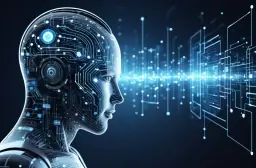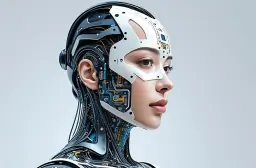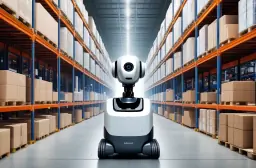How AI Transforms Daily Life: Smart Tech Innovation Unveiled
Table of Contents
In today’s fast-paced world, technology is evolving at an unprecedented rate, and artificial intelligence (AI) has become a driving force behind much of this change. From smart homes to personal assistants, AI is revolutionizing the way we live, work, and interact with the world around us. But have you ever stopped to think about how AI is impacting your daily routine? It’s easy to overlook, yet this smart technology is becoming seamlessly integrated into our lives, often without us even noticing.
Imagine waking up to a smart home that adjusts the temperature, draws the blinds, and starts brewing your coffee—all based on your preferences and routine. These are just a few examples of AI-powered solutions that are enhancing everyday life. However, this isn’t science fiction; it’s happening now. But how exactly does AI integrate into our day-to-day lives, and what benefits can we expect?
The rise of intelligent automation has paved the way for a future where tasks that once seemed tedious or time-consuming can now be handled with ease. But is AI truly making life easier, or are we becoming too dependent on machines? This article will explore the powerful influence of AI in our daily lives, from voice assistants and smart devices to predictive technologies and beyond.
AI in Household Management

Transforming Homes with AI Technology
One of the most noticeable shifts in the modern world is the rise of smart home systems, where AI takes center stage. Whether it’s your thermostat adjusting to the perfect temperature, your refrigerator suggesting recipes based on what’s inside, or your lighting automatically adjusting to your activities, AI is fundamentally altering how we interact with our homes. These AI-powered systems offer convenience and comfort, making daily living a lot more efficient.
Smart home devices like voice assistants (e.g., Amazon Alexa, Google Assistant) are becoming indispensable tools, allowing us to control various functions without lifting a finger. The integration of AI into household appliances helps in managing everything from entertainment to security.
- Predictive Technology: AI learns your preferences and anticipates your needs, adjusting settings automatically based on your habits.
- Voice-activated Assistants: Devices like virtual helpers streamline tasks like turning on the lights, checking the weather, or making shopping lists with simple voice commands.
- Intelligent Systems: AI ensures a more personalized experience by recognizing patterns in your actions and adapting accordingly.
These advancements not only offer AI convenience but also promote energy efficiency and help reduce costs by optimizing usage.
AI for Personalized Comfort
With the help of AI, everyday tasks in the home are becoming more intuitive. Smart home systems adjust lighting, temperature, and even entertainment systems to suit your lifestyle. Imagine returning home after a long day, and your house has already set the perfect ambiance based on your preferences.
- Customized Experiences: From controlling your home’s lighting system to regulating the room temperature, AI provides tailored comfort.
- Automated Task Management: Devices like smart vacuums or dishwashers can schedule cleaning routines without any input from you, making household chores feel like a thing of the past.
These innovations are just the beginning of what smart technology can do to create a more automated and comfortable home environment.
AI for Personal Productivity
Boosting Efficiency Through AI Tools
AI isn’t just making our homes smarter; it’s also transforming how we work and manage our time. With tools powered by machine learning, tasks that once took hours can now be completed in minutes. AI applications in personal productivity are reshaping the way we approach both work and leisure.
For instance, AI assistants like Siri and Google Assistant help organize daily schedules, send reminders, and assist with a variety of tasks—all while learning to improve over time based on user feedback. In the workplace, AI-driven software can manage tasks such as data entry, customer service inquiries, and even complex decision-making processes. This technology is helping businesses and individuals achieve greater productivity and efficiency.
- Automated Task Management: With AI-powered solutions, you can streamline your to-do lists, manage emails, and prioritize tasks efficiently.
- AI for Work-Life Balance: AI helps find a balance between work and relaxation by managing your schedule and offering timely reminders to take breaks.
- Enhanced Decision Making: Cognitive computing in AI allows for real-time analysis of data, offering insights that support better decision-making.
These AI applications are not just making tasks easier—they’re actively contributing to a more productive and well-balanced lifestyle.
The Future of AI in Productivity
Looking ahead, AI for productivity will continue to evolve, enabling more personalized and advanced systems for managing personal and professional tasks. AI will not only manage your time but anticipate your needs before you even have to ask.
AI in Transportation and Mobility

Enhancing Daily Commuting with AI
The integration of smart technology in transportation is already changing how we travel. AI-driven lifestyle features are not limited to our homes and workspaces; they extend into the vehicles we drive and the transportation systems we use. Autonomous vehicles, smart traffic systems, and AI-based apps are making commuting more efficient, safe, and sustainable.
- Autonomous Vehicles: Self-driving cars are equipped with AI-powered systems that can make real-time decisions based on data, reducing human error and increasing safety.
- AI for Traffic Management: AI can optimize traffic flow, reducing congestion and travel times by predicting traffic patterns and adjusting signals accordingly.
- Smart Mobility Solutions: Ride-sharing services powered by AI algorithms match passengers with drivers, optimizing routes and wait times.
The future of AI in transportation holds exciting possibilities, including the development of fully autonomous vehicles and more intelligent mobility solutions that will redefine the daily commute.
AI for Health and Well-being
AI-Powered Health Solutions
AI is also making a significant impact on health and wellness. From wearable smart gadgets that track physical activity to AI-driven health assistants that monitor vital signs, artificial intelligence is revolutionizing how we manage our health. Personalized health recommendations, predictive analysis for potential health risks, and intelligent systems for managing chronic conditions are just a few of the ways AI is enhancing well-being.
- Personalized Health Tracking: Wearable devices use AI to monitor your fitness levels, sleep patterns, and even heart rate, providing valuable insights into your health.
- AI for Medical Diagnosis: AI-powered diagnostic tools analyze medical data and assist doctors in making faster, more accurate diagnoses.
- Mental Health Support: Virtual assistants and AI applications can offer emotional support and help manage mental health by providing stress-relief exercises and reminders.
With AI integration, healthcare is becoming more accessible, efficient, and personalized, making it easier for individuals to stay on top of their health.
The Potential of AI in Medicine
Looking forward, AI will continue to play a pivotal role in revolutionizing healthcare, from automated medical treatments to advanced research into disease prevention and personalized therapies.
Frequently Asked Questions (FAQs)
What are the common AI tools used in daily life?
AI tools such as virtual assistants, smart home systems, and wearable devices are commonly used in daily life to manage tasks, improve comfort, and track health.
How does AI improve productivity?
AI enhances productivity by automating routine tasks, organizing schedules, and providing intelligent insights that help individuals and businesses work more efficiently.
Can AI help with health and wellness?
Yes, AI-powered solutions are used to monitor health metrics, provide personalized fitness recommendations, and assist in medical diagnostics and mental health support.
Is AI safe to use in daily life?
While AI provides convenience and efficiency, it’s important to ensure privacy and security. AI-powered systems should be used with awareness of data privacy settings.
Conclusion
The integration of artificial intelligence in everyday life is reshaping the way we live, work, and interact with our surroundings. From AI-powered home systems and personal assistants to smart health gadgets and autonomous vehicles, AI is enhancing our lives in ways we never imagined. As AI advancements continue to unfold, we can expect an even more seamless and tech-enhanced life in the future, where AI-driven lifestyle becomes the norm.
By embracing AI personalization, we can create a more efficient, comfortable, and productive world. The possibilities are endless, and it’s clear that AI in everyday life will continue to redefine the future.










